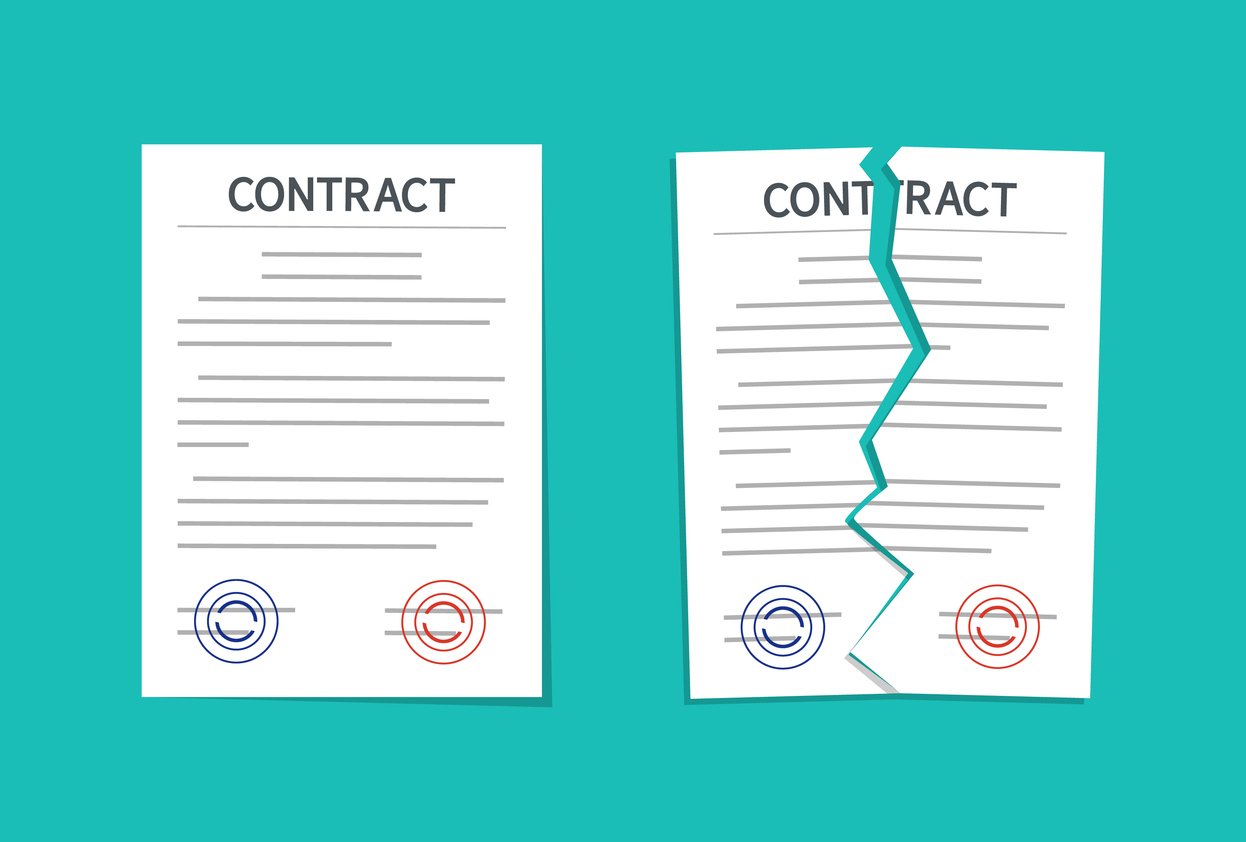In this article, we will explore the basics of a material breach of contract and its implications. We’ll follow this up with a brief discussion on the remedies available, provide a few common examples, and offer guidance on handling these types of breaches, especially within the context of California law. By the end of this discussion, you should have a comprehensive understanding of how material breaches can affect your business and what steps you can take to protect your interests.

What is a Material Breach of a Contract
A material breach of contract occurs when one party’s failure to perform their duties goes to the very heart of the agreement, rendering the contract irreparably broken. This type of breach is so substantial that it undermines the contract’s purpose, depriving the non-breaching party of the benefits they expected to receive. In essence, a material breach strikes at the core of what both parties sought to achieve through their agreement.
The key distinction between a material breach and a minor breach is the impact on the contractual relationship. While a minor breach might allow the contract to continue with some adjustments, a material breach typically justifies termination of the contract and may lead to legal action. This distinction underscores the importance of understanding the gravity of a breach, as it affects the remedies available and the course of action that should be taken.
Key Factors Determining Materiality
Several factors are considered in determining whether a breach is material:
- Extent of Performance: How much of the contract’s benefit was denied to the non-breaching party? This factor assesses whether the breach substantially affects the overall value of the contract to the non-breaching party, hindering their ability to achieve the contract’s intended outcome.
- Intentionality: Was the breach willful or an inadvertent oversight? The intent behind the breach can influence the severity of the consequences. A deliberate breach may be viewed more seriously than one resulting from negligence or unforeseen circumstances.
- Likelihood of Remedy: Can the breaching party correct the failure? If the breach can be easily remedied, it may not be considered material. However, if the breach causes irreversible harm, it is more likely to be deemed material.
- Impact on Non-Breaching Party: How significantly does the breach affect the non-breaching party’s ability to benefit from the contract? This factor considers the broader implications of the breach on the non-breaching party’s operations, financial health, and overall business objectives.
Material Breach of Contract Examples
To further define material breach of contract, let’s explore a few common examples.
Failure to Deliver Essential Goods or Services
Imagine a scenario where a supplier fails to deliver critical components required for production within the specified timeframe, causing significant operational delays for the buyer. This could be deemed a material breach because it disrupts the buyer’s ability to fulfill their obligations and benefit from the contract. The resulting delays can lead to lost revenue, damaged business relationships, and increased operational costs.
In another example, consider a software developer contracted to deliver a bespoke software solution for a business. If the developer fails to meet the agreed-upon specifications or deliver the software on time, the business may be unable to launch a new product or service, resulting in lost market opportunities and competitive disadvantage.
Non-Payment for Services Rendered
If a client refuses to pay for services that have been fully performed and delivered as per the contract terms, this non-payment can be considered a material breach. The service provider is deprived of the primary benefit—payment—thus justifying termination or legal action. Non-payment disrupts cash flow and can have a cascading effect on the provider’s financial stability and ability to continue operations.
Additionally, non-payment can strain the relationship between the contracting parties, leading to a breakdown in trust and potential reputational damage for the client, especially if the dispute becomes public knowledge. This underscores the importance of honoring financial commitments in contractual agreements.
Violating Confidentiality Agreements
In agreements involving sensitive information, breaching confidentiality clauses can constitute a material breach. Such actions can cause irreparable harm to the non-breaching party, particularly if the information is proprietary or trade-secret in nature. The unauthorized disclosure of confidential information can result in competitive harm, loss of business opportunities, and legal liabilities.
Furthermore, a breach of confidentiality can damage the non-breaching party’s reputation and erode trust with clients, partners, and stakeholders. This type of breach highlights the critical need for robust confidentiality agreements and the serious consequences of failing to uphold them.
Material Breach of Contract in California
California law recognizes material breaches as grounds for legal remedies, which may include contract termination and claims for damages. The courts in California assess material breaches based on the factors mentioned earlier and the specific terms outlined in the contract. This legal framework provides a structured approach for evaluating breaches and determining appropriate remedies.
The state emphasizes the importance of clearly defining terms and conditions within contracts to prevent disputes. Therefore, businesses operating in California should ensure that contracts specify what constitutes a material breach, delineating the consequences of such a breach. Clear contract language can help prevent misunderstandings and provide a solid foundation for resolving disputes if they arise.
Moreover, California’s legal system supports the use of alternative dispute resolution methods, such as mediation and arbitration, to resolve contract disputes efficiently. This approach can help parties avoid the time, expense, and uncertainty of litigation while achieving mutually satisfactory outcomes.

Material Breach of Contract Remedies
When faced with a material breach of contract, several remedies are available to the non-breaching party.
Termination of the Contract
The non-breaching party may opt to terminate the contract, thereby freeing themselves from any further obligations and potentially avoiding further losses. Termination can be a strategic decision, allowing the non-breaching party to seek new opportunities or partnerships without the constraints of a flawed contract.
However, termination is not always a straightforward process. Parties must carefully consider the contractual terms and any notice or cure provisions before proceeding with termination. Legal counsel can provide guidance on the appropriate steps to take and help ensure compliance with contractual and legal requirements.
Damages
Compensatory damages aim to make the non-breaching party whole by covering the financial losses incurred due to the breach. These damages are calculated based on the actual harm suffered and are intended to restore the non-breaching party to the position they would have been in had the breach not occurred. In some cases, punitive damages may be awarded to punish the breaching party for particularly egregious conduct.
In addition to compensatory and punitive damages, parties may seek consequential damages for indirect losses resulting from the breach, such as lost profits or business opportunities. The availability of these damages depends on the foreseeability and direct connection to the breach, making it essential to document and substantiate claims thoroughly.
Specific Performance
In instances where monetary damages are insufficient, the court may order the breaching party to fulfill their contractual obligations, particularly in cases involving unique goods or services. Specific performance is an equitable remedy that compels the breaching party to perform as agreed, ensuring that the non-breaching party receives the benefit of the bargain.
This remedy is often sought in cases involving real estate transactions, where the subject matter is considered unique and irreplaceable. However, specific performance is not always granted, as courts consider factors such as feasibility, fairness, and the adequacy of monetary damages before ordering this remedy.
Rescission
Rescission effectively cancels the contract and returns both parties to their pre-contractual positions. This remedy is typically pursued when the contract’s purpose has been entirely frustrated. Rescission aims to undo the effects of the contract and restore the parties to their original state, as if the contract had never been executed.
While rescission can provide a clean break from a problematic agreement, it may not always be practical or desirable, especially if the parties have already partially performed or if third-party rights are involved. Parties should carefully weigh the pros and cons of rescission and seek legal advice to determine its suitability in their specific circumstances.
Navigating Material Breach of Contract Disputes
For small business owners, corporate managers, and employers, understanding how to handle a material breach is vital. Here are steps to consider when faced with such a situation:
- Review the Contract: Thoroughly examine the contract terms to understand your rights and obligations, as well as any clauses related to breach and remedies. This initial step is critical for identifying the specific nature of the breach and determining the appropriate course of action.
- Document Everything: Maintain detailed records of the breach, including communications and any attempts to resolve the issue. Comprehensive documentation can serve as valuable evidence in negotiations or legal proceedings, demonstrating the non-breaching party’s diligence and efforts to address the breach.
- Consult Legal Counsel: Engage with an experienced attorney to assess the situation and determine the best course of action, ensuring your interests are protected. Legal counsel can provide strategic advice, evaluate potential remedies, and represent your interests in negotiations or court proceedings.
- Consider Mediation or Arbitration: If feasible, explore alternative dispute resolution methods to achieve a mutually agreeable outcome without the need for litigation. These methods can offer a more cost-effective and efficient means of resolving disputes while preserving business relationships.
- Prepare for Litigation: Should litigation be necessary, work with your attorney to build a solid case, gathering evidence and identifying witnesses as needed. Litigation can be complex and time-consuming, requiring careful preparation and strategic planning to achieve a favorable outcome.
Conclusion
A material breach of contract can have profound implications for businesses, affecting operations, financial health, and reputational standing. By understanding what constitutes a material breach, recognizing the remedies available, and taking appropriate action, businesses can safeguard their interests and navigate disputes with confidence. In the complex landscape of contract law, having a knowledgeable legal partner is invaluable for resolving disputes efficiently and effectively.
For those in Southern California, seeking expert legal counsel ensures that you are equipped to handle material breaches and other contractual challenges with precision and clarity. By fostering a proactive approach to contract management and dispute resolution, businesses can minimize risks, protect their investments, and maintain strong commercial relationships.
Contact Our Beverly Hills Law Firm
The Los Angeles breach of contract attorneys of our premier law firm, Law Advocate Group, offer comprehensive solutions to individuals and business entities in matters involving contract law, litigation, and contract disputes. Our contract attorneys work with clients to provide clear guidance to help recover losses and build a strong case for both direct and indirect damages, and help clients sue for breach of contract when necessary.
To speak with a member of our team, call us at (310) 651-3065 or fill out the form below so that we may get in touch with you as soon as possible.




